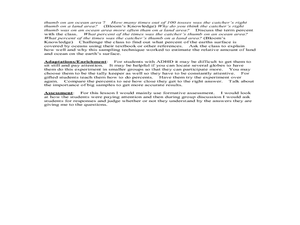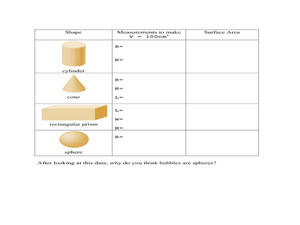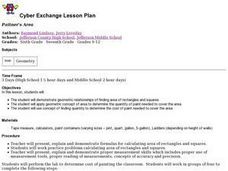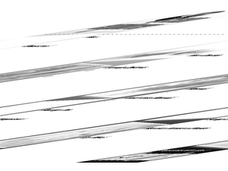Carnegie Mellon University
Marcellus Shale: Who Pays?
After viewing short clips of unfortunate events, your class will consider two sides of a homeowner's court case, and then learn about the Marcellus shale deposit beneath the state of Pennsylvania and the hydraulic fracturing process. In...
Curated OER
What Part of the Earth's Surface is Covered by Oceans?
Third graders investigate oceans. In this Earth science lesson, 3rd graders predict how much of the Earth's surface is covered by oceans. Students determine if their predictions are accurate by throwing a globe to each other and then...
Curated OER
Seismic Waves
Students identify the four types of seismic waves, their characteristics and effects. Then they predict the level of damage each wave might cause in a residential area and test their predictions against several computer animations. ...
Curated OER
Playground Measurement
Fifth graders find a rectangular or square object in the classroom to measure. They measure to the nearest centimeter and apply that knowledge to measuring perimeter. They recognize, describe, and determine surface area and volume of...
Curated OER
Review of Triangles
Students investigate the Pythagorean Theorem. In this geometry lesson, students define angles and sides of right triangles. They calculate the area and surface area using formulas derived by the Pythagorean Theorem.
Curated OER
Searching for Meanings Beneath the Surface of the Poem
Young scholars analyze poetry. For this cultural perspectives lesson, students read the poem "Soccer Until Dusk" by Mark Brazaitis. Young scholars analyze the poem and consider the cultural perspective it reveals.
Center Science Education
Feeling the Heat
What is an urban heat island? Middle school meteorologists find out by comparing temperatures at different locations on campus. They relate their findings to what might be happening in a concrete jungle and how it impacts local weather....
Alabama Learning Exchange
Pennies, Pennies and More Pennies
Learners determine the number of pennies needed to fill a room. For this pennies lesson plan, students work in groups to determine the number of pennies needed to fill a room. They compute the probability of the head of a pin landing...
Curated OER
Science: Lead Shot and Waterfowl
Students examine data to investigate the impact of lead shot pellets on waterfowl populations. They graph their findings and discover how lead in ingested by birds and poisons them. As an extension, students research legislation and...
Curated OER
Winter-time Temps
Students measure temperature and become aware the the temperature above and below the snow is different. In this winter temperature lesson, students measure temperatures to find variation based on how the snow is packed. Students create...
Curated OER
Why are Bubbles Spheres
Students calculate the surface area of different polygons. In this geometry lesson, students practice calculating the volume of spheres. They work with cones, cylinders and rectangular prisms.
Curated OER
A Sphere and Its Net
Students identify and sketch the nets for sphere. In this geometry activity, students differentiate between two and three dimensional shapes. They find the surface area of each sphere.
Curated OER
Around the Clock
Middle schoolers discover the relationship between the circumference of a circle and its diameter. They find the length of an arc of a circle.Students use estimation strategies in real-world applications to predict results (i.e.,...
Teach Engineering
Projections and Coordinates: Turning a 3D Earth into Flatlands
Introduce your class to map projections and coordinates, the basics for the work done in a GIS, with an activity that uses Google Earth to challenge learners to think about the earth's shape.
Mathematics Assessment Project
Estimating Volume: The Money Munchers
Don't stuff money under your mattress. To find out why learners first complete a task determining how $24,000 in cash would affect the height of a mattress and whether this same amount would fit into a suitcase of given dimensions. They...
Mathematics Assessment Project
Applying Angle Theorems
Polygon ... an empty bird cage? After finding the angles of a polygon, young mathematicians use the provided methods to solve the problem in multiple ways.
Curated OER
Opening A Cube
Fifth graders investigate mathematical concepts related to the construction of a three dimensional cube. They construct the cube from two dimensional patterns and compute the surface area. Students also define the faces, edges, and...
Curated OER
Sketching Cylinders
Learners create nets of cylinders. In this geometry lesson, students calculate the surface area of cylinders and other solids. They show their understanding of three-dimensional shapes by solving problems.
Curated OER
Triangle Explorer
Students calculate the area of triangles using a variety of materials including computer applets.
Curated OER
Painter's Area
Learners demonstrate geometric relationships of finding area of rectangles and squares. They apply determine the quantity of paint needed to cover the area by using the concept of quantity.
Curated OER
Year Book Page Special Shape Collage
Students design a collage of pictures for a yearbook that make a shape. They determine the area of the shape and the price of putting the collage in the yearbook.
Curated OER
The Solstices
Compare surface temperatures when the solstice occurs in the different hemispheres. Young scientists draw conclusions from their investigation of data collected using spreadsheets and a globe.
Curated OER
Anchialine Cave Species
Ever heard of a stygofauna or a stygobite? How about an anchialine cave? Set your young biologists on a quest to find information about organisms that live in and have adapted to life in caves located near the water. Class members then...
Curated OER
Creating Climographs
Students use satellite data to compare precipitation and surface temperatures on different islands. In this satellite lesson students create graphs and explain the differences between weather and climate.

























